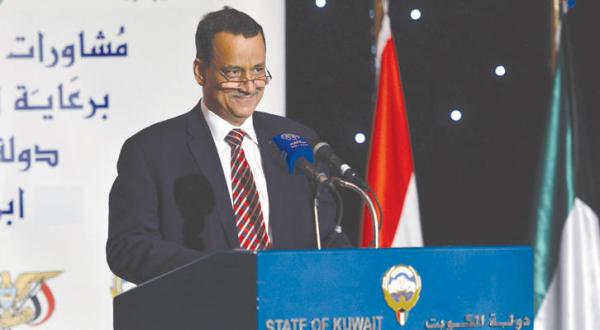Details of key issues pertaining to detainees, prisoners and those who are in hiding under duress are being discussed at the Yemen peace consultations that are currently taking place in Kuwait. Both the government and rebel delegations submitted special lists of hostages held by opposing sides as part of efforts to release half of the detainees before or at the beginning of the holy month of Ramadan.
While the government delegation’s list of individuals held by Houthi militias included the names of political, military and human rights figures in addition to figures from the media and press, activists and fighters, names on the rebel delegation’s list raised eyebrows. It included Brigadier General Ahmed Ali Abdullah Saleh, the son of the former president Ali Abdullah Saleh, along with the names of people killed in the fighting.
A source close to the consultations said the fact that the rebels put Ahmed Ali Abdullah Saleh’s name on the lists of prisoners confirms “the rebels’ lack of seriousness about proceeding with the release of detainees and political hostages or a prisoner exchange.” The source, who declined to be named, added that “this is considered a new challenge to the resolutions of international legitimacy because Ahmed Ali Saleh is a wanted man” and “is categorised as an obstructionist to a peaceful settlement in Yemen”. The source continued by saying that “this is another step to block the process of releasing detainees and abductees and by discussing an illusion, it is wasting the time and efforts of the committee”.
The rebels submitted the lists of those who they claim are prisoners one day after the government delegation submitted its list which included more than 2,600 detainees, prisoners, hostages and those under house arrest.
On the other hand, sources close to the consultations said that the UN envoy Ismail Ould Cheikh Ahmed held a meeting with the legitimate government delegation yesterday and another with the rebel (Houthi- Saleh) delegation. The sources added that he presented a comprehensive political and security draft map for a solution that includes the formation of a number of committees, the most important of which are a military committee that is expected to consist of neutral military figures and an economic committee which was proposed a few days ago to help stop the decline of the Yemeni economy that was caused by the militias depleting the foreign cash reserves of the Central Bank of Yemen.
